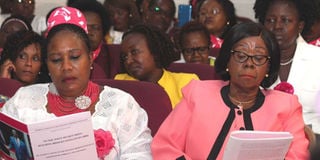BBI an indispensable tool towards creating an equitable society

"Remember, all men would be tyrants if they could. If particular care and attention is not paid to the ladies, we are determined to foment a rebellion, and we will not hold ourselves bound by any laws in which we have no voice, or representation."
―
These words could have been uttered in a completely different era and context, but they resonate with the Kenyan situation where, gender equality has not been attained in spite of sustained efforts over the years.
As a marginalised group, women globally resonate with Abigail Adams’ remarks. Her words gives a glimpse on how the women of Kenya are passionate and determined to push all the boundaries to ensure there is equal representation on a 50-50 basis, as the Building Bridges Initiative gains momentum.
We had just asked for Two-Thirds and they rejected now we want 50-50 like yesterday.
But we have to look back to understand the trajectory of these thoughts. The contentious 2017 election had a brighter side on women political participation. It was the year that witnessed the highest number of women ever to be elected nationally and in the devolved units in Kenya.
Of the 1,883 elected seats in both levels of governance, 172 are women compared to 142 in 2013.
This, without doubt, is a major milestone in the quest for gender equality. But more needs to be done because we are not yet where we should be as a country in as far gender equality is concerned.
One of the major stumbling block to this noble cause is patriarchy, which is presented in its raw form in the National Assembly by both men and women, who still believe that women should remain in their gender stereotyped roles.
This cadre of thinking is subtly Neanderthal and arrogantly ignorant of the reality of a changing world in which women are no longer treated as second class citizens but people of substance who are integral in the development of our country.
I have got news flush for those who still live in this backburner of stunted retrogressive zone.
Gender equality is a phenomenon whose time came long time ago and should be implemented.
This is why the Constitution in Article 27, among other things, guarantees gender equality in all elective and appointive positions.
This is where the two-third gender rule arises. In spite of concerted efforts by progressive minds and organisations to push for the passing of the two-thirds gender Bill in the National Assembly, nothing has moved except that roundabout games of musical chairs from political charlatans and sheer lack of political will, which have refused to melt and pave way to a society that prides itself in equity and equality.
Window of opportunity
And just as the women fraternity mulled the next cause of action on the blatant relegation of the two-thirds rule to the peripheries and trampled upon by the enemies of an equitable society, a window of opportunity popped up at the opportune moment. Halleluiah! Here is BBI!
The country is once again charting a new socio-political and economic dispensation. Women MUST be in the forefront to push for gender equality, and demand a 50-50 gender representation in government positions.
As the young generation like to say, “Tuko hapa kwa hapa na BBI”. Every step BBI takes, women will amplify their voices until these objectives are achieved.
The current system is dominated by men who worship on the altar of patriarchy. Unfortunately, these same men who occupy every inch of our political, social and economic spheres are as mean-spirited as I remember them being.
Parliament is a disgrace and it is no longer viable to court thinking it will help realise equality in our society. Women and like-minded people are now looking for other means to enforce Affirmative Action Bills, and BBI ranks high right now.
Their cringe and hesitation to pass the two-thirds gender Bill acts as the fuel that fires the struggle to negotiate the shoals and rapids of gender equality, because to abandon affirmative action is to say there is nothing more to be done about deep-rooted discrimination against women in this country.
Engendering BBI is an indispensable tool towards some semblance of a more equitable society.
BBI, which is on its second leg, which will witness big spaces for public participation, gives women the rare opportunity to engage in conversations geared towards policy reforms that favour them.
Above all, there should be unfettered political will if we are to achieve gender equality.
Systematic exclusion requires systematic inclusion.
Dorothy Jebet is a political and gender commentator.




